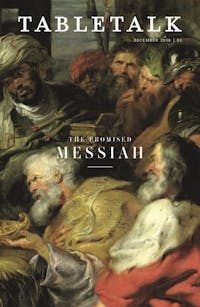
Request your free, three-month trial to Tabletalk magazine. You’ll receive the print issue monthly and gain immediate digital access to decades of archives. This trial is risk-free. No credit card required.
Try Tabletalk NowAlready receive Tabletalk magazine every month?
Verify your email address to gain unlimited access.
Imagine the country you once cherished now divided, broken, overrun by corrupt leadership, imperiled by vast international powers, and seemingly on the brink of collapse. Imagine the best of your leaders crippled by poor character, indecision, and unwise international alliances. The political and cultural conditions in Jerusalem in the eighth century BC were shaped by these dark concerns and provided the immediate background to the prophecy of Isaiah 9:6–7. The northern kingdom of Israel had turned against her sister to the south, Judah, in an ill-advised coalition with Syria to the north, a coalition that would lead to the destruction of both of its parties at the hands of the Assyrian army. Judah was left alone with diminishing prospects for survival.
Into this dire situation, Isaiah spoke an oracle of hope about a child who would be born to the kingdom and bring national and international restoration to the world.
The passage begins by assuring the southern audience that the northern kingdom will be included in the restoration from exile (9:1). The coming restoration will include all the children of Israel, even those tribes of the rebellious northern kingdom (see Ezek. 37:16–17). Even for the north and its capital, Samaria, the darkness of exile will one day come to an end, and the sunrise of restoration and the new king will appear. The gospel of Matthew shows how kingdom restoration comes in the ministry of Jesus Christ (Matt. 4:12–16). He is the light shining in the gloom.
From Isaiah’s perspective, what is important is that this coming restoration will see a reunification of the two kingdoms of Israel under a king in the line of David (see 2 Sam. 7:14). The child’s birth will mark the end of their suffering in exile. The child in Isaiah 9 is the new king who will inaugurate the restoration period for the people of God after the long years of exile.
Isaiah 9:1–7 evokes a coronation ceremony in which royal titles are read aloud before an audience of subjects and dignitaries. In this case, each title depicts the superlative characteristics of the new regent that will serve him as he establishes his future kingdom as the light that replaces the darkness of the coming exile.
Wonderful Counselor. The meaning of this title might seem obscure to a modern audience. A counselor in this case involves a master of wisdom and its teachings. This sage-counselor would have served in the court of the king, who in turn ruled as the head of the judiciary for the land. The restoration king, however, will excel in all areas of wisdom, much like Solomon of old, but himself will be a counselor of miraculous proportions whose counsel is accompanied by affirming wonders (Matt. 12:42; Luke 11:31; 1 Cor. 1:24). As such, he will resolve the problem of the poor leadership of old (Isa. 3:3).
Mighty God. This title indicates that the king will be identified with the divine sovereign from whom his authority is derived. This king will not be like Israel’s first king, Saul, who was “little in his own eyes” (1 Sam. 15:17), an insecurity that caused him to lead the nation toward his own ends and not the ends of the Lord. The restoration king will be identified with the sovereign divine king from whom he, and every other worldly power, receives his authority on earth (Matt. 28:18).

Everlasting Father. This title involves another feature of the throne: the king as the father of the nation. Christians will remember that the fatherhood of God is the primary theme in the prayer that Jesus teaches to His disciples (6:9). In the prayer, the believer is encouraged to pray to God as a Father whose kingdom will come and whose royal will ought to be done in the earthly as well as heavenly realm. In Isaiah 9, “father” language is not meant to connote close intimacy as much as the reverence with which one regards the king (John 10:30; 14:9–10).
Prince of Peace. This last title refers to the abundance and wholeness of the restoration kingdom to come. The title “prince” is not necessarily a title of lesser authority in the government than “king” but rather includes a larger group of ruling officials. Not only will the coming son of David be king, he will be a ruler who ushers in a period of shalom—peace—of welfare and community wholeness for the kingdom. Justice will be done. The poor and the oppressed will be given rest. And each will live fully and wholly toward their God-ordained vocations (John 17:20–23; Gal. 3:27–29; Phil. 1:6).
For the prophet Isaiah, the assurance of this restoration kingdom and her king provided a great cause for hope and celebration. His were dark times, and they were going to become darker still, but the Lord in His “zeal” (9:7) would not allow the darkness to last forever. We have much in common with Isaiah’s audience. The longer God seemed absent in the grim realities of exile, the more audacious was the claim that a restoration king was coming. Our claim that the King is returning is likewise bold, but we know the King of whom Isaiah was speaking. We have known Him, and He is coming back for us, and His return will be glorious.
